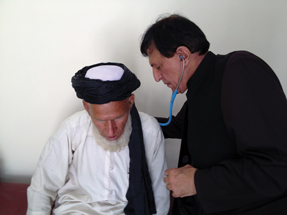One doctor trying to cure a country
Aziz Kamali, MD, FACP, seeks to rebuild his homeland of Afghanistan by restoring medical care.
Like many of his colleagues, Aziz Kamali, MD, FACP, has a stated goal of “sharing my knowledge with the young generation who are interested in becoming internists.”
But the general internist and volunteer associate clinical professor at the University of California Davis also has some more unusual ambitions. “Another goal of mine is to restore peace and civility, as well as law and order in Afghanistan. I want to open schools for girls and establish clinics for women. I want to implement a nationwide vaccination program,” he said.

Those goals may sound lofty, but Dr. Kamali has already done much to improve health care in his native country. In 1988, he raised the money and supplies to open a clinic in Pakistan for Afghan refugees; in 2008, the clinic moved into Afghanistan. Today, the 30-bed hospital in Jalalabad, housed in a rented building formerly used by U.S. troops, is known as the Omar Kamali Medical Center, named after Dr. Kamali's son, who died in 2008.
Dr. Kamali received a medical degree from Kabul University and was completing a residency in the United Kingdom when the Soviet Union invaded Afghanistan in 1979. He chose to move to the U.S. in the 1980s and completed his internship and residency at Detroit Receiving Hospital and San Joaquin General Hospital in Stockton, Calif., before entering private practice.
These days, on his visits to the medical center in Afghanistan, Dr. Kamali sees cases quite different from those back home in California. “One harsh winter night, a couple with a young boy aged 10 years old came to our clinic for evaluation of abdominal pain,” he said. “We removed close to two gallons of intestinal worms from his tummy.”
But the patients seen at the center represent only a tiny fraction of the need for care in Afghanistan, Dr. Kamali noted. “Forty years of war has totally destroyed the infrastructure of the country and health care system. Everything needs to be revamped and reestablished,” he said.
As a start toward that redevelopment, he's working to build a larger medical center. “I acquired 110 acres of land in 2011. The goal was to build a state-of-the-art hospital to decrease our dependency on surrounding countries,” Dr. Kamali said. His ultimate ambition is a 350-bed medical center that provides patient care, as well as training for physicians, pharmacists and midwives.
Dr. Kamali has already done significant fundraising for the project, and a groundbreaking is planned, but much more help is needed to make the hospital a success, he noted. “I call upon all of my colleagues from all specialties to volunteer their time [for patient care and clinician training],” he said. “We also need medical technology companies to donate.”
He's optimistic that such support will come.
“Since 1988, I single-handedly funded everything without any aid from outside, until recently some people came up to the plate showing their readiness to make a change in the lives of deprived people of Afghanistan,” Dr. Kamali said. “We are hopeful with the support of our colleagues from the U.S. as well as international communities that the message of this humanitarian effort will spread and help generate the much-needed assistance across the globe.”
More information about Dr. Kamali's efforts is available on his program's website.




